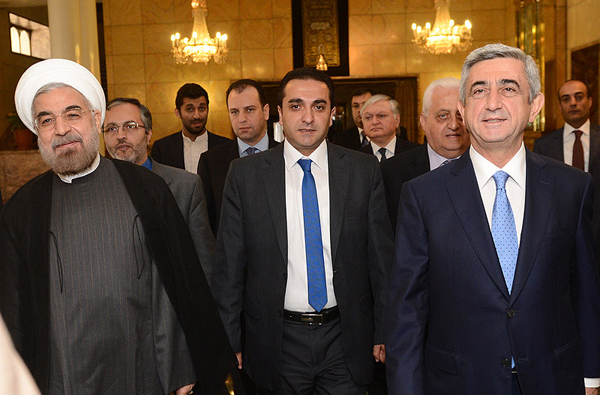Prime Minister Hovik Abrahamyan by the invitation of the First Vice-President of Islamic Republic of Iran, Eshaq Jahangiri, recently visited Iran. At the meeting with Jahangiri, Hovik Abrahamyan expressed confidence that the visit will give a new impetus to mutually beneficial cooperation between the two countries. IRI First Vice-President noticed that the economic relations yield to the available high-level political dialogue.
Both sides emphasized that there is a great potential for economic partnership and it is necessary to do everything possible to give a new impetus to joint projects and programs for bringing them to life. They also emphasized the need for activating the economic relations. H. Abrahamyan mentioned that Armenia’s agreement to join the Eurasian Economic Union would open new perspectives for the future development of the country’s economy, as well as opportunities for foreign investments. H. Abrahamyan’s and Jahangirii’s one-on-one talk was followed by an extended staff meeting, during which they touched upon the implementation process of a number of projects of strategic significance, and their prospects.
The Prime Minister of Armenia met with IRI Foreign Minister Mohammad Zafad Zarif and discussed regional issues and bilateral cooperation. And in the meeting with Iranian President Hassan Rouhani, has mentioned that Iran is willing to support the Armenian initiatives, as well as implementation of joint programs. In the meeting with the Iranian president, the Prime Minister of Armenia also spoke about Armenia’s accession to the EaEU and emphasized that it enables to assume the role of a liaison for the members of this structure and foreign business communities, and that favorable conditions have been created in Armenia for investments.
Read also
A day before the visit of the Prime Minister, the RA President’s advisor had shared some information on partnership with Iran and the programs. In the “Armenia’s economic prospects in the EaEU” conference, the RA President’s Advisor Karine Minasyan said that Iran is interested in closer relations with Armenia, given Armenia’s accession to the Eurasian Economic Union. “Joining the Eurasian Economic Union, Armenia can become a road for Iran to the Russian market, so it is interested in continuing and further deepening the partnership with Armenia,” mentioned Minasyan according to “Armenpress”.
According to the “Ekho Kavkaza”, Armenia and Iran are planning to open another, the third electricity transmission line over Araks river. Iranian Energy Minister Hamid Chitchian informed that the two parties want to expand their capabilities of transmitting the electricity. Moreover, Iran, Armenia accelerates the paces of construction of two hydro power plants on the Araks river. “The bank problems were hampering the implementation of the project for some time, but now those issues are resolved,” informed Chitchian. The last moves implemented by Armenia’s government authorities on the way to joining the EaEU, are quite remarkable. One gets the impression that the government of Armenia is trying to keep balance in foreign policy directions.
Official Yerevan is expressing readiness to expand the relations with the EU and there have already been responds and assertions by several European diplomats that with regard to co-relations with Armenia, Brussels is thinking about what direction to take on to move forward. A few days ago, the Prime Minister visited the United States, now the neighboring country Iran, a country towards which the sentiment of international community in recent times has been changed significantly. The former US Secretary of State Henry Kissinger’s assessment a few days ago was noteworthy that Iran is a natural ally of the United States. According to his words, it’s the ideological, religious component that makes it an antagonist. Under the current sentiment of the West towards Armenia’s strategic ally Russia, and the sanctions against Russian, perhaps, Armenia’s government authorities moving toward the Eurasian Union are conscious of what unpredictable situation, first, the isolated “sponsor” country may appear, moreover, its ally or “satellite” countries. The recent moves implemented by Armenia’s government officials in the foreign policy are probably due to this.
As to what results will be, is still, of course, too early to speak about, but it should also be noted that, however, at lease attempts are made by the government authorities to show some independence in the foreign policy and not to hand over everything under the “disposition” of Russia.
Emma GABRIELYAN





















































